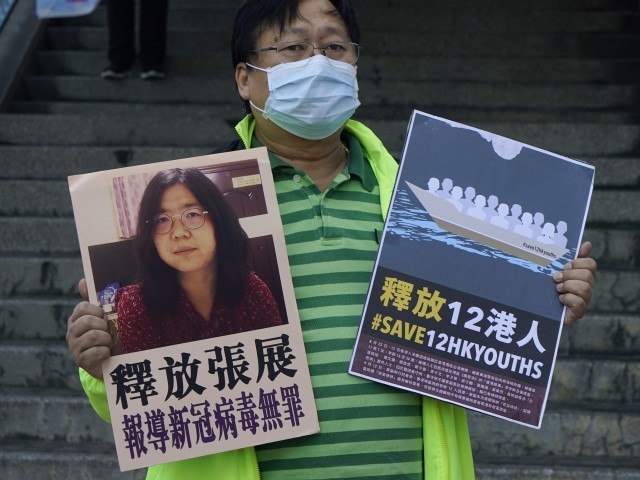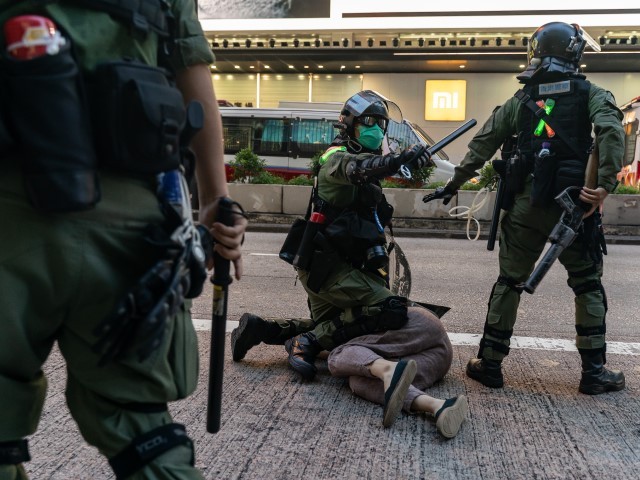The Committee to Protect Journalists (CPJ) accused authoritarian governments in a report published Thursday of using the Chinese coronavirus pandemic as an excuse to intensify repression, revealing that it had documented the highest number of imprisoned journalists globally for the second consecutive year in 2021.
The CPJ’s annual report on press freedom confirmed the arrests of 293 people around the world for practicing journalism. In 2020, CPJ documented a then-record high of 273 people, which it has since revised to 280. China, the country where the Chinese coronavirus pandemic originated, topped the list of the world’s worst jailer of journalists, the third year it has taken the title. Many of those behind bars were arrested on vague charges like “picking quarrels and provoking trouble,” a crime under the communist regime, after attempting to document Beijing’s poor handling of the coronavirus outbreak within its borders.
In 2020, CPJ observed that silencing accurate reporting on governments failing to control the coronavirus fueled many of that year’s arrests. This year, the organization accused authoritarian governments of using the pandemic as a distraction to dampen outrage at their human rights abuses.
“Emboldened autocrats are increasingly ignoring due process and flouting international norms to keep themselves in power,” CPJ observed in its report published Thursday. “In a world preoccupied with COVID-19 and trying to prioritize issues like climate change, repressive governments are clearly aware that public outrage at human rights abuses is blunted and democratic governments have less appetite for political or economic retaliation.”
The organization highlighted one of the most egregious examples of press repression still ongoing: the imprisonment of Zhang Zhan, a former lawyer and citizen journalist who recorded footage of overcrowded hospitals and poor Communist Party infectious disease management during the early days of the pandemic in Wuhan.
“Freelance video journalist Zhang Zhan [pictured below], arrested in May 2020 for her critical coverage of China’s response to the COVID-19 pandemic, is serving four years for ‘picking quarrels and stirring up trouble,'” CPJ relayed, “– a charge often used to target peaceful critics of the ruling Chinese Communist Party.”

A pro-democracy activist holds placards with the picture of Chinese citizen journalist Zhang Zhan outside the Chinese central government’s liaison office in Hong Kong, Monday, Dec. 28, 2020. Zhang, a former lawyer and citizen journalist from Shanghai, has been sentenced to four years in prison for her reporting on the initial coronavirus outbreak in Wuhan, China. The activists demand the releases of Zhang, as well as the 12 Hong Kong activists detained at sea by Chinese authorities. (AP Photo/Kin Cheung)
In 2020, CPJ found China again to be the top jailer of journalists in the world, as it was in 2019. At the time, it warned of a precipitous decline in press freedom in response to the pandemic.
“A record number of journalists were imprisoned globally for their work in 2020 as authoritarian nations arrested many covering COVID-19 [Chinese coronavirus] or political instability,” CPJ reported at the time. “Amid the pandemic, governments delayed trials, restricted visitors, and disregarded the increased health risk in prison; at least two journalists died after contracting the disease in custody.”
The record-breaking number of journalist arrests in the two years following the beginning of the pandemic came after several years of moderate decline, indicating that the world was trending slightly away from persecuting journalists until regimes found a prime excuse for silencing them. The previous record-high number of journalists arrested, as documented by CPJ, was 272, in 2016. That year was largely an outlier due to the aftermath of the alleged attempted coup that summer against Turkish Islamist leader Recep Tayyip Erdogan. After returning to power, Erdogan immediately began shutting down or seizing media outlets in what was once one of the world’s richest news scenes. At the peak of the repression, Erdogan shut down 131 media outlets in one day. The Erdogan regime arrested many of their employees on a variety of dubious charges of “terrorism” or collaboration with the alleged coup.
In 2021, CPJ noted that Turkey fell from second to sixth place in repression, but mostly because there were very few journalists left to silence.
By 2018, the number CPJ reported was 255 jailed journalists, a modest but clear declining trend.
The CPJ estimates of imprisoned journalists are likely extremely low compared to the true number of journalists incarcerated worldwide. CPJ notes that their tally only includes individuals known to be in police custody and accused of crimes directly related to journalism. It does not include individuals who disappeared while covering sensitive stories – as it is impossible to confirm if a state actor has abducted them – or those who were arrested but charged with unrelated crimes despite being journalists.
Press freedoms were not the only ones lost during the pandemic. In March, Freedom House published a broader analysis of human rights globally, finding that many regimes used the pandemic to repress ethnic and religious minorities as well as journalists and political dissidents. The report, titled Democracy Under Siege, specifically blamed China for coercing or inspiring other world leaders to curb human rights at home.
“Beijing ramped up its global disinformation and censorship campaign to counter the fallout from its cover-up of the initial coronavirus outbreak, which severely hampered a rapid global response in the pandemic’s early days,” the report read. “Its efforts also featured increased meddling in the domestic political discourse of foreign democracies, transnational extensions of rights abuses common in mainland [the legal territory of] China, and the demolition of Hong Kong’s liberties and legal autonomy.”
Freedom House found a heightened number of examples of “excessive surveillance, discriminatory restrictions on freedoms like movement and assembly, and arbitrary or violent enforcement of such restrictions by police and nonstate actors” around the world.
The United Nations, which allows China membership on its Human Rights Council despite being arguably the world’s most repressive regime, warned last year that a growing number of countries were violating the human rights of their citizens in the name of stopping coronavirus “disinformation.”
“People have died because governments have lied, hidden information, detained reporters, failed to level with people about the nature of the threat, and criminalized individuals under the guise of ‘spreading false information,'” U.N. Special Rapporteur on Freedom of Expression David Kayem said at the time. “People have suffered because some governments would rather protect themselves from criticism than allow people to share information, learn about the outbreak, know what officials are or are not doing to protect them.”
